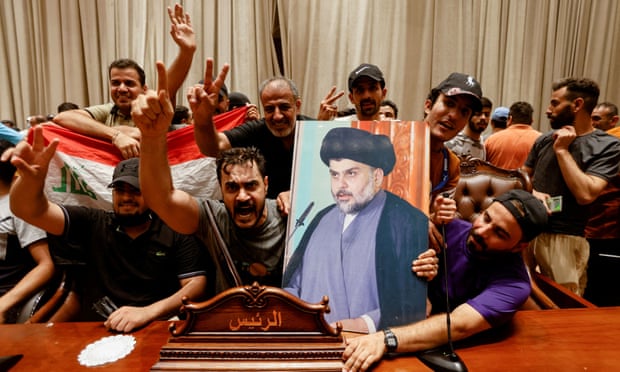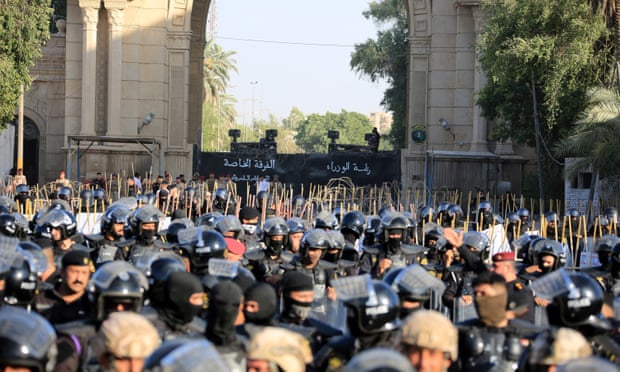Hundreds of supporters of powerful Iraqi cleric Moqtada al-Sadr stormed Baghdad’s high-security Green Zone and danced and sang in parliament to protest the nomination of a rival prime minister.
Police fired tear gas in an attempt to stop the protesters from breaching the gates of the heavily fortified Green Zone, but the crowd pressed ahead and entered Parliament.
“I am against the corrupt officials in power,” protester Muhammad Ali said. .
The protests are the latest challenge for oil-rich Iraq, which is mired in political and socioeconomic crisis despite rising global energy prices.
Sadar Constituency was formed Election in October The largest parliamentary bloc, but still short of a majority, remains deadlocked over the formation of a new government after nine months.
Crowds of people swarmed around the Parliament building waving national flags, taking photos, chanting and cheering.
Prime Minister Mustafa al-Khatemi called on protesters to “withdraw immediately”, warning that security forces would “ensure the safety of government institutions and foreign missions, and prevent any harm to security and order”.
But it took the orders it issued Shia leader Sadr After about two hours, the crowd of protesters began to leave.
“Reform revolution and rejection of injustice and corruption,” Sadr wrote on Twitter in support of the protesters.
“Your message has been heard … you have scared the corrupt,” he added, calling on the protesters to offer a prayer “before returning home safely”.
“We obey Zayed,” chanted the crowd as they quietly left parliament, a tribute to Sadr by recognizing him as a descendant of the Prophet Mohammed.

In last year’s elections, Sadr’s constituency won 73 seats, making it the largest segment in the 329-seat parliament. But after the referendum, talks to form a new government have stalled.
Protesters oppose the candidacy of former minister and former provincial governor Mohammad al-Sudani, who is the pro-Iranian coalition’s choice for prime minister.
The coalition structure draws lawmakers from former Prime Minister Nouri al-Maliki’s party and the pro-Iranian Fatah coalition, the political wing of the Shiite-led ex-paramilitary group Hashed al-Shaabi.
“I oppose Sudani’s candidacy because he is corrupt,” said protester Muhammad Ali.
“We reject the whole political process,” said one protester in parliament, Bashar, who gave only his first name. We want an independent person who serves people.
Iraq plunged into political crisis last month when 73 of Sadr’s lawmakers walked out en masse.
Sadr initially supported the idea of a “majority government”, which would have sent his Shiite opponents out of the coalition structure into opposition.
The former militant leader then surprised many by forcing his lawmakers to resign, which is seen as putting pressure on his rivals to fast-track the formation of a government.
Sixty-four new lawmakers took office in late June, making the pro-Iran caucus the largest in parliament.

Earlier this month, hundreds of thousands of Muslim worshipers loyal to Sadr attended a Friday prayer service in Baghdad in a show of political strength.
The huge turnout came despite sweltering heat and the Shia cleric’s absence in person – a sign of his status as a political heavyweight and a major religious authority.

“Friend of animals everywhere. Devoted analyst. Total alcohol scholar. Infuriatingly humble food trailblazer.”